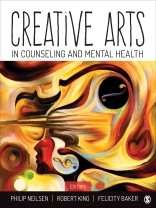Drawing on new paradigms and evidence-based discoveries in neuroscience, narrative psychology, and creativity theory, this text explores the beneficial role of expressive arts within a recovery perspective. A framework of practice principles for the visual arts, creative writing, music, drama, dance, and digital storytelling is addressed across a number of settings and populations, providing readers with an accessible overview of techniques taught in counseling programs in the U.S. and abroad.
สารบัญ
Chapter I: Introduction – Robert King, Felicity Baker & Philip Neilsen
A Theoretical Framework for Creative Arts in Recovery
A Note on the Evidence Base for Creative Arts in Recovery
What You Will Find in this Book
About the Authors
Chapter II: Lived experience: writing and recovery – Robert King, Jon Scott & Jane Boggs
A Writing Workshop
Clubhouse Writers
Chapter III: Lived experience: visual art and music in recovery – Robert King, Patricia Strobel, Tom O’Brien & Ann Bermingham
Patricia Strobel
Tom O’Brien
Ann Bermingham
Chapter IV: Visual arts: principles and evidence base – Clare Edwards, Tom O′Brien & Robert King
Abstract
Background
Study Aims
Overview of Study Design
Results
Discussion
Chapter V: Visual arts: multidisciplinary day program in practice for young people with severe mental health problems – Sandra Drabant & Robert King
The Mater Child and Youth Mental Health Service (CYMHS) Day Program
Jack’s Story and Art Therapy Assessment
Discussion
Chapter VI: Visual arts: the place of the art exhibition in mental health recovery
Introduction
The Art Exhibition – What Are We Talking About?
The Realisation of the Art Show
The Social Nature of the Art Show – Being Part of a Collaborative Event
The Relationship Between Exhibiting Art and Identity Development in Mental Health Context
The Purpose of the Art Show for the Recovery Community Network
Recommendations for Staging an Art Show in the Mental Health Recovery Context
Chapter VII: Creative writing: literature review and evidence-based research – Philip Neilsen
Introduction
Creative Writing – Definition
Theoretical Frameworks and Explanatory Models
Commentary on Theoretical Frameworks
Discussion
Chapter VIII: Creative writing: a practice-based account of designing and facilitating life-writing workshops for a group with severe mental illness – Philip Neilsen & Robert King
Introduction
Materials and Methods, Participants and Setting
Intervention
Preparation For and Delivery of the Workshops
Workshop Dynamics
Data Collection
Chapter IX: Music therapy and mental health recovery: what is the evidence? – Claire Stephensen & Felicity A Baker
What is Music Therapy?
Music Therapy Methods in Recovery
Music Therapy Approaches in Research and Practice
Current Evidence
Chapter X: Music: the Interface of music therapy and psychotherapy with adolescents in a hospital-based, consultation-liaison mental health service: eclecticism in action – Katherine Aitchison
Music Therapy in CYMHS
Music Therapy and the Question of Orientation
Evidence for the Efficacy of Music Therapy in Child and Youth Mental Health
Eclecticism: An Integrated Approach
Therapeutic Songwriting with Adolescents
Fostering Understanding: A Psychodynamic Approach
Case Study: Sarah
Offering Acceptance: A Humanistic Approach
Case Study: Kathy
Facilitating Development: A Behavioural/Cognitive-Behavioural Approach
Case Study: Jayden
Chapter XI: A dance/movement therapy recovery model: engagement in stages of change – Anne Margrethe Melsom & Jill Comins
Introduction: Dance/Movement Therapy in Recovery-Oriented Systems of Care
A Proposed Dance/Movement Therapy RECOVERY Model
Use of the Therapist-Self within the Dance/Movement Therapy RECOVERY Model
Emergence of the Dance/Movement Therapy RECOVERY Model
Stages of Change and Dance/Movement Therapy: An Integrative Conceptualisation
Integrative Conclusions: Stages of Change and the DMT RECOVERY Model
Applications of the Dance/Movement Therapy RECOVERY Model
Chapter XII: The evidence base for dance/movement therapy in mental health: moving the body of knowledge – Sherry W. Goodill
Introduction
Systematic Review and Meta-Analyses
Levels of Evidence and Example Studies
Summary of Evidence for DMT
Recommendations
Chapter XIII: Applied theatre for mental health: literature review and evidence-based research – Andrea Baldwin
Definitions
Forms of Drama Practice in Relation to Mental Health
Theatrical Theatre
Drama as Social Experience
Drama as Therapy: Psychodrama and Drama Therapy
Models of Drama Therapy
The Difference Between Drama as Therapy and Drama as Social Experience
How Does Participation in Drama Support Recovery?
Evidence of Effectiveness: How Participation in Drama Supports Recovery
Chapter XIV: Respect yourself drama education program in practice – Andrea Baldwin
Introduction
Program Outline
Clinical Rationale
Implementation
Example Session
Longer Term Effects
Digital storytelling for the self-advocacy of marginalised identities: theory and practice
Introduction
Overview of Case Studies
Narrative Practice and Empowerment
Storytelling as Praxis
Notice One
My Secret Story
Greg’s Sermon
เกี่ยวกับผู้แต่ง
Felicity Baker is a Music Therapist, Associate Professor in Music Therapy and currently an Australia Research Council Future Fellow (2010-2015) based at The University of Melbourne. she is currently Associate Editor the Journal of Music Therapy and immediate past President of The Australian Music Therapy Association Inc, the peak body of the discipline in Australia. Felicity has established herself as an international leader in music therapy and is regularly invited to teach in institutions through Asia, UK/Northern Europe and the USA. Felicity is recognised for her research expertise in therapeutic songwriting and in neurorehabilitation. Her text Song Writing Methods, Techniques and Clinical Applications for Music Therapy Clinicians, Educators and Students is a best seller (Jessica Kingsley Publishers) which has sold over 4, 000 copies and has been translated into Korean and Italian. Felicity is a member of a Research Consortium involving music therapy researchers from 9 international universities from USA, UK, Norway, Denmark, Finland, and Australia with international recognition of being at the forefront of music therapy research. Her innovative research has attracted significant media attention. She has achieved a strong publication record (4 books, 17 book chapters, and 70+ peer reviewed journal articles) and developed a recognized capacity for cross-disciplinary research.












